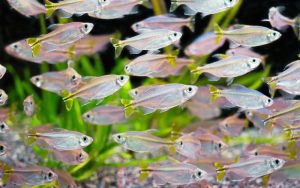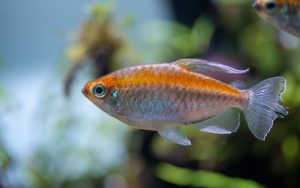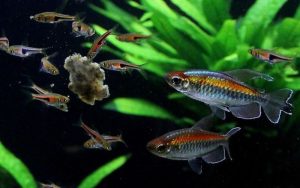Guppies are beautiful and popular aquarium fish, but they can be tricky to keep happy and healthy. If you’re wondering what do guppies like in their tank, you’re in luck! This blog post discusses seven things guppies love in their tank.
From the proper water temperature and pH level to plenty of plants and hiding places, we’ll cover everything you need to create a tank that your guppies will love.
So whether you’re a seasoned aquarist or just starting, read on for our tips on what do guppies need to live!

By following these tips, you can create a tank that your guppies will love. You can enjoy watching them swim and play for many years with a bit of care and attention.
Table of Contents
ToggleWhat Do Guppies Like in Their Tank?
What do guppies need in their tank? Guppies are relatively easy to care for, but there are a few things you can do to make sure they are happy in their tank.
Here are seven things required in a guppy tank:
- Adequate space. Guppies are active fish and need a minimum fish tank of at least 10 gallons for a small group.
- Proper water conditions. Guppies prefer water that is warm (72-82°F), slightly alkaline (pH 7.0-7.8), and with a moderate level of hardness.
- A planted tank. Guppies love to swim among plants, which provides them with hiding places and helps to keep the water clean.
- A clean tank. Regular water changes are essential for keeping guppies healthy.
- A varied diet. Guppies are omnivores and enjoy a variety of foods, including flakes, live food, and vegetables.
- Peaceful tank mates. Guppies are delicate and should be kept with other temperate fish species, such as neon tetras or Cory catfish.
- A little excitement. Guppies can be kept in a community tank, but they also enjoy having some space to themselves. You can provide them with some enthusiasm by adding floating plants or decorations that they can explore.
By following these tips, you can create a tank that your guppies will love. With a little caring for guppies, you can enjoy watching them swim and play for many years to come.
Here are some additional tips for keeping guppies healthy:
- Install a filter to keep the water clean and free of debris.
- Add a tank water conditioner to remove chlorine and other harmful chemicals from the water.
- Test the water regularly to ensure the parameters are within the correct range.
- Feed your guppies a high-quality diet appropriate for their size and age.
- Avoid overfeeding your guppies, as this might lead to water quality problems.
- Provide your guppies with plenty of hiding places to feel secure.
- Monitor your guppies for signs of illness and take them to a veterinarian if necessary.
By following these tips, you can help your guppies live long and healthy lives.
The Ideal Tank for Guppies
– Tank Size Matters
The first consideration when setting up a guppy tank is its size. Guppies thrive in spacious environments, and a larger tank provides more stable water conditions. Aim for a tank with at least 10 gallons of water to comfortably accommodate a small school of guppies.
– Substrate: Sand or Gravel?
Choosing a suitable substrate is essential for your guppy tank. Many guppies prefer sand as it mimics their natural habitat and is easier to clean. However, gravel can work well too, especially if it’s smooth and doesn’t have sharp edges.
– Live Plants for a Lively Tank
Guppies like heavily planted tanks. Live aquarium plants provide hiding spots, resting places, and security for these fish. Adding live plants also helps to maintain water quality by absorbing nitrates and giving oxygen.
– Water Heater for Warmth
Guppies are tropical fish and require a stable water temperature between 74 and 81 degrees Fahrenheit (24 to 27 degrees Celsius). Invest in a reliable aquarium heater to maintain the ideal temperature for your guppies.
– Proper Filtration with a Filter
An efficient aquarium filter is crucial for keeping the tank water clean and free from harmful substances. Guppies need well-filtered water to stay healthy and thrive.
– Adding an Air Pump for Oxygenation
Guppies require well-oxygenated water to breathe comfortably. An air pump helps to circulate and aerate the water, providing sufficient oxygen for your aquatic friends.
– Appropriate Lighting in their Tank
Proper aquarium lights are essential for both live plants and guppies. Aim for a lighting system that supports plant growth and enhances the vibrant colors of your guppies.
Creating a Guppy Haven
Heavily Planted Tanks: A Guppy’s Paradise
To replicate their natural habitat, consider having a heavily planted tank. The lush greenery offers hiding spots for fry and creates a beautiful and calming environment for adult guppies.
The Significance of Well-Oxygenated Water
Guppies need well-oxygenated water to survive and grow. Adequate oxygen levels promote their health and vitality, and the use of an air pump is highly recommended.
The Right Water Conditions
Maintaining the right water conditions is crucial for guppies’ well-being. Regularly test and adjust the water parameters to keep them within the ideal range.
Compatibility and Community Tanks
– Guppies and Their Tankmates
Guppies are peaceful fish that get along well with other non-aggressive species. Consider keeping them in a community tank with other peaceful fish to create a harmonious environment.
– Peaceful Fish for Happy Guppies
Choose tankmates that won’t harm your guppies. Peaceful species such as mollies, platies, and tetras are excellent companions for guppies.
Feeding Guppies with Care
– Understanding Guppy’s Diet
A balanced diet plan is essential for the well-being of your guppies. They are omnivorous and require a mix of high-quality flakes, pellets, and live or frozen foods.
– Nutritious and Varied Meals
Offer a variety of foods to keep your guppies healthy and happy. Incorporate live or frozen treats like brine shrimp or daphnia into their diet occasionally.
Breeding Guppies: The Miracle of Life
Preparing for Breeding
If you want to witness the miracle of life, consider breeding guppies. Create a separate breeding tank with plenty of hiding spots and provide optimal conditions for breeding.
The Process of Breeding
Guppies are prolific breeders, and female guppy can give birth every 4-6 weeks. Understand the breeding process and learn how to care for the fry after birth.
Guppy Care and Maintenance: what guppies need?
Water Changes and Tank Cleaning
Regular water changes are essential to maintain water quality. Perform weekly partial water changes to keep your guppies in a clean and healthy environment.
Controlling Algae Growth
Algae can be a common issue in aquariums. Keep the tank away from direct sunlight and maintain a proper light cycle to prevent excessive algae growth.
Dealing with Common Issues
Stay attentive to your guppies’ behavior and appearance. Look out for signs of disease or stress and address any issues promptly.
Commonly Asked Questions (FAQs)
What size tank is best for guppies?
Guppies prefer a tank that holds at least 10 gallons of water. This size allows them to swim freely and provides a stable environment for their well-being.
Can I use sand as a substrate in my guppy tank?
Yes, sand is an excellent substrate in a guppy fish tank. It mimics their natural habitat and is easier to clean compared to gravel.
How do live plants benefit guppies?
Live aquarium plants such as java moss offer numerous benefits to guppies. They provide hiding spots, resting areas, and security, making your guppies feel at home. Additionally, plants help maintain water quality by absorbing nitrates and providing oxygen.
Do guppies need a water heater?
Do guppies need a heater in their tank? Guppies are tropical fish native to South America and require a stable water temperature between 74 and 82 degrees Fahrenheit (24 to 27 degrees Celsius). A water heater is essential to maintain the ideal temperature for their well-being.
Can I keep guppies with other fish?
Guppies are peaceful freshwater fish that could be kept in a community tank with other non-aggressive species. Mollies, platies, and tetras are excellent tankmates for guppies.
What should I feed my guppies?
Guppies are omnivorous and enjoy a varied diet. To keep them healthy and happy, offer them high-quality flakes, pellets, and occasional live or frozen treats like brine shrimp or daphnia.
How often should I change the water in the guppy tank?
Regular water changes are crucial to maintaining water quality. Perform partial water changes every week to keep the tank clean and provide a healthy environment for your guppies.
How can I control algae growth in the guppy tank?
To control algae growth, ensure the tank is not exposed to direct sunlight. Also, maintain a proper lighting cycle and avoid overfeeding, as excess nutrients can contribute to algae growth.
What should I do if my guppies show signs of illness?
If your guppies show signs of illness or stress, isolate the affected fish and treat them in a separate tank. Consult with a veterinarian or a knowledgeable aquarium expert for proper diagnosis and treatment.
Can I breed guppies in my aquarium?
Yes, guppies are prolific breeders, and you can breed them in your aquarium. Create a separate breeding tank with plenty of hiding spots for the fry, and provide optimal conditions to encourage breeding.
What do guppies like in their tanks?
Guppies like heavily planted tanks: live plants, gravel or sand at the bottom of the fish tank, a water heater to maintain warmer water, an air pump to oxygenate the water, enough tank size, and light in their tank.
Do guppies need a filter in their tank?
Guppies need a filter installed in their tank to keep the water clean and provide the necessary water circulation.
Can guppies survive without live plants in their tank?
Yes, guppies can survive without live plants, but they prefer tanks with live plants, providing them with hiding spaces and a natural environment.
Can guppies be kept in a tank without gravel or sand?
Yes, guppies can be kept in a tank without gravel or sand, but it is recommended to have a substrate at the bottom of the tank to provide a natural habitat for the guppies.
Do guppy tanks require an air pump?
Guppy tanks do not necessarily require an air pump, but it is beneficial to install one to oxygenate the tank water and improve the overall water quality.
How much light do guppies need in their tank?
Guppies need a moderate amount of light in their tank. Providing them with a regular light cycle of 8-12 hours daily is best.
Can guppies be kept in a community tank with other larger fish?
Guppies can be kept in a community tank with other larger fish as long as proper compatibility and tank size are considered. It’s essential to ensure that the other fish in the tank do not see guppies as food.
Can guppies survive in a tank without a filter?
Guppies can survive in a tank without a filter, but it is not ideal. A filter helps maintain water quality by removing toxins and providing water circulation, which contributes to the overall health and well-being of the guppies.
How big of a tank do guppies need?
Guppies can be kept in a tank as small as 5 gallons, but it’s best to provide them with a larger tank of at least 10 gallons to allow for more swimming space and better water parameters.
Final Thoughts
So, what do guppy fish like in their tank? In conclusion, understanding what do guppies like in their tank is essential for their well-being and happiness. Providing a spacious and heavily planted environment with proper filtration, heating, and lighting is vital. Keeping them in a harmonious community with compatible tankmates and offering a varied and nutritious diet ensures their health and vitality. With proper care and attention, your guppies will thrive, and you’ll enjoy the beauty and charm these colorful fish bring to your aquarium. Keep reading to find out what do guppies need to live.
You might also like
- Do Guppies Need a Bubbler: (3 Easy Ways to Fix Oxygen)
- 5 Most Expensive Guppies in the World: What You Need to Know
- Why Guppies Eat Their Young: (5 Reasons & Solutions)
- Can Guppies Survive Without a Filter: Here’s How to SAVE Them!
- Does Guppies Need an Air Pump: The ANSWER Will SHOCK You!
- What Does Guppy Eggs Look Like in Water: 3 Important Facts!
- Do Guppies Need a Filtered tank: 3 Key Benefits of Using a Filter!
- Salt Water Guppy: 3 Easy Steps to Thriving in Your Tank!
- Will Guppies Eat Shrimp: Discover the Surprising Harmony!
- Do Guppies Eat Algae: A Comprehensive Guide You’ll Ever Need!
- How Long Can Guppies Survive Without Air Pump? (Solved)
- 5 Secrets to Achieving Ideal Endler Guppy Water Parameters at Home!
- Best Temperature for Guppies to Breed Successfuly!
- Can Guppies and Tetras Live Together in Harmony!





